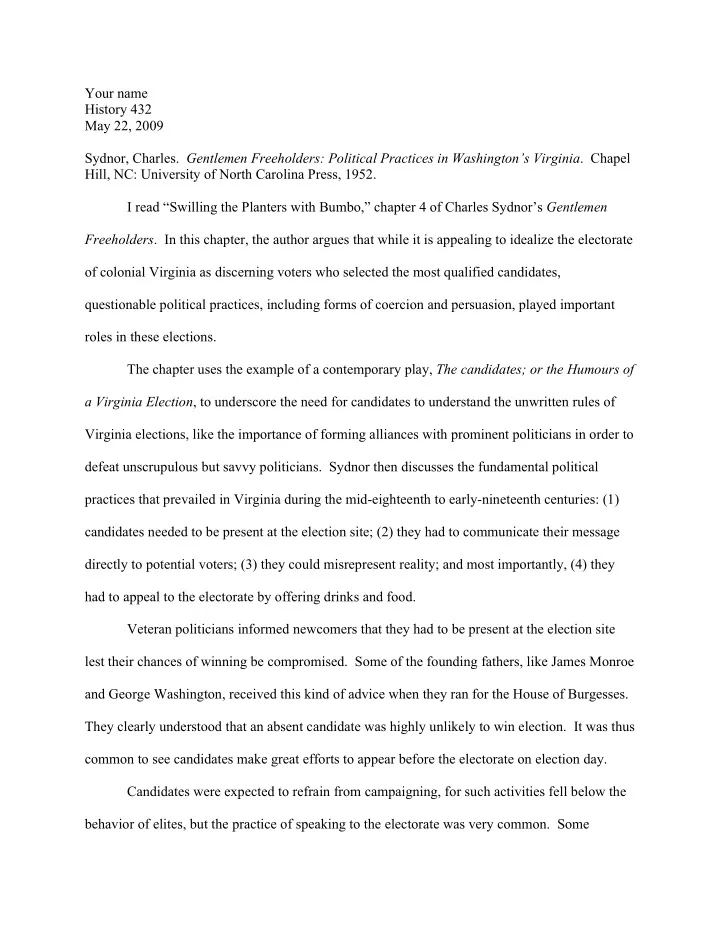

Your name History 432 May 22, 2009 Sydnor, Charles. Gentlemen Freeholders: Political Practices in Washington’s Virginia . Chapel Hill, NC: University of North Carolina Press, 1952. I read “Swilling the Planters with Bumbo,” chapter 4 of Charles Sydnor’s Gentlemen Freeholders . In this chapter, the author argues that while it is appealing to idealize the electorate of colonial Virginia as discerning voters who selected the most qualified candidates, questionable political practices, including forms of coercion and persuasion, played important roles in these elections. The chapter uses the example of a contemporary play, The candidates; or the Humours of a Virginia Election , to underscore the need for candidates to understand the unwritten rules of Virginia elections, like the importance of forming alliances with prominent politicians in order to defeat unscrupulous but savvy politicians. Sydnor then discusses the fundamental political practices that prevailed in Virginia during the mid-eighteenth to early-nineteenth centuries: (1) candidates needed to be present at the election site; (2) they had to communicate their message directly to potential voters; (3) they could misrepresent reality; and most importantly, (4) they had to appeal to the electorate by offering drinks and food. Veteran politicians informed newcomers that they had to be present at the election site lest their chances of winning be compromised. Some of the founding fathers, like James Monroe and George Washington, received this kind of advice when they ran for the House of Burgesses. They clearly understood that an absent candidate was highly unlikely to win election. It was thus common to see candidates make great efforts to appear before the electorate on election day. Candidates were expected to refrain from campaigning, for such activities fell below the behavior of elites, but the practice of speaking to the electorate was very common. Some
politicians even spoke at their church and sent letters to other churches to publicize their candidacy. This approach was particularly important since some groups, like the Quakers and the Presbyterians often voted in bloc. At times, candidates simply communicated their stance on specific issues, but they often engaged in finger-pointing in order to attack their opponents. Similarly, house-to-house visits and even hosting voters at the candidate’s house were customary. Publicly, candidates ascribed to the tenet that soliciting votes was beneath them, but not doing it could, and did, cost some of them an election. For example, Monroe, who disliked the practice of directly soliciting votes, acknowledged that he had to engage in it. Otherwise, he would be at a disadvantage. Likewise, election officials warned voters of the dangers of falling victim to the charms of the candidates, but the practice did offer them an opportunity to gauge politicians more closely. Lying about one’s opponent or misrepresenting one’s political views also became common practice. A candidate could distort reality by saying that his opponent had formed an alliance with an unpopular politician, that he had raised taxes, or that he was an elitist. Others made populist promises that they could never have kept or implied that they could pass legislation unilaterally. Though some candidates campaigned and others did not, virtually all of them provided food and drink to potential voters. Men such as Washington, Jefferson and John Marshall, openly offered this form of entertainment in the days preceding an election. Some candidates actually hosted parties at their house or encouraged voters who lived far from the election site to stay overnight at their estates. Voters thus came to expect this form of entertainment and even showed up without formal invitations. The supply of liquor and food was especially high on election day. For example, in 1758, Washington provided 160 gallons of liquor to the 391 voters
who arrived at the precinct. Though losing candidates complained of the practice, the Virginia assembly did not act unless an explicit quid pro quo could be proven. Politicians simply had to adapt to Virginia politics or risk losing the election, as James Madison discovered when he failed to offer food and drink and promptly lost the election. Political practices in colonial Virginia were anything but an exercise in disinterested campaigning. These customs certainly reveal that coercion, more than political acumen, informed the electorate.
Recommend
More recommend